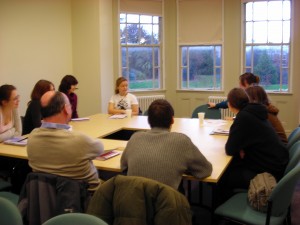At the Open Days last week I had a lot of questions about careers in museums. We always get involved at our University’s careers fairs and we have even held our own Careers Event in the past (that’s where the photos are from). A couple of years ago I got a fellowship grant from the Center for Career Management Skills and a consultant Janet Bell came in to help us create some workshops and resources for our students. This being the digital age I thought I would make some of this information available online.
First of all a disclaimer. As we are based in the UK I am going to focus on the situation in Britain. I am also going to focus on advice for getting museum jobs. There are some really interesting and important debates going on regarding the impact of museum studies courses on the sector, diversifying the workforce and unpaid internships. I will discuss some of these issues but my main aim is to provide advice for those who are trying to break into the sector.
There are already some great resources on the web. The Museums Association careers page is a good place to start and it’s pretty comprehensive. The Museums Association is a membership organisation for museum professionals but you can join at a low rate if you are a student or volunteer. You get a monthly copy of the Museums Journal and free/discounted entry into many museums and exhibitions. Tip: Before going into an interview in the UK have a flick through recent copies of Museum Journal and search for your potential workplace in the Journal via the website.
The other site that I always send people to is the University of Leicester’s Museum Studies Job Desk. That is where most people in the UK search and advertise. It includes information on internships and voluntary opportunities and even lists international job opportunities. Those two sites will give you a lot to be getting on with and I will talk about voluntary work in the next post.





